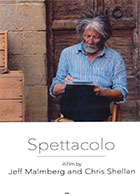
Spettacolo 2017
Distributed by Grasshopper Films, 12 East 32nd St., 4th Floor, New York, NY 10016
Produced by Jeff Malmberg, Matt Radecki, and Chris Shellen
Directed by Jeff Malmberg and Chris Shellen
DVD , color, 91 min.
College - General Adult
Theater
Date Entered: 03/08/2018
Reviewed by Andy Horbal, University of Maryland LibrariesSpettacolo begins in the past. Archival footage of the Tuscan village of Monticchiello segues into scenes from the play the town’s Teatro Povero theater company has put on each year since 1967 as a voiceover says, “I think it was just by chance. There was no plan, just by chance we turned our lives into a play. Our piazza became our stage and everyone in town played a role. At a certain point we realized that the play wasn’t just an annual event, it was more of a life-long event, and so our life became one long play.”
Most viewers will already know from the back of the DVD box that this tradition whereby the townspeople perform an original play about their own lives every summer is in danger of dying out as the population of Monticchiello (136, we are informed) ages and shrinks. The prologue and the scenes which follow the title card set the tone for the rest of the film. Bucolic landscapes shrouded in mist give way to a town hall meeting where the villagers share ideas for what this year’s play could be about with Andrea, the director. This, in turn, is followed by an oral history of the event which inspired Monticchiello’s first “autodrama” (as they call the form), an incident during World War II when German occupiers rounded up the entire town with the intention of executing everyone for aiding anti-fascist partisans, but abruptly decided not to after the intercession of a German woman from the same city as the Kommandant.
As the film returns to the present day, its strategy seems clear: capture the natural beauty of the setting without going too far in the direction of postcard-like idealization; allow the villagers speak for themselves as much as possible by using them as the only narrators; employ archival material often, but always in small amounts; and respect the history of the play, but while keeping the main narrative focus on the process of the current edition coming together. This approach could be the recipe for a relatively straightforward tale of tradition fighting against the winds of modernity, which indeed might have provided the basis for a very good film. Pay attention to the rhythm of the (typically gorgeous) establishing shots and hints dropped by the subjects, though, and additional layers of meaning begin to reveal themselves.
Take, for instance, the statement made by a member of the crew that “the theater for us in Monticchiello is like a second job,” which is followed much later by a similar comment by another villager that “what was once our nightly entertainment--meeting in our piazza to rehearse--had begun to feel like a burden to many of us.” On the surface, they both seem to be referring to the same thing: as life gets busier and busier, it becomes harder and harder to find time to maintain traditions. Indeed, this does seem to be what the first speaker, who indicates that this is a problem “especially at a time like this when the world is spinning so fast,” means. The second statement, however, follows closely behind a complaint by Andrea after a frustrating rehearsal that “we have an audience to face and the national press.” Might the play be something of a victim of its own success?
Another reading is suggested by something else Andrea says at around this point in the film: after proclaiming that he thinks it’s inevitable that a tradition like this one must eventually end, he states that “in order to continue, we all must struggle forward together, and we must all still believe in what we set out to do in the beginning.” This echoes comments by other villagers that at some point Teatro Povero lost its way. More information about the evolution of the play can be found in the brief history on the company’s website, but it’s obvious just from the evidence of the footage of the performances that it grew more ambitious over the years. Although the villagers blame the change in the theater on a schism that resulted from Andrea’s controversial decision to explicitly address a divisive new development a few years before, the seasonal structure (titles inform us of the passage of time from “winter” to “spring,” “summer,” and finally “fall”) and increasingly frequent use of sunset shots by the filmmakers suggest that all of this might be part of a natural lifecycle.
Of course, this assumes that directors Jeff Malmberg and Chris Shellen were the ones in control. It seems likely that the townspeople, specifically Andrea, had input into the film’s final form, and that we should therefore consider it to represent their vision to some extent. How much doesn’t matter: once you start having thoughts like this, you notice all sorts of other things, like the fact that far less than 136 people attend the town hall meetings where the play is written, raising questions about whose version of Monticchiello’s story Teatro Povero is telling.
Although some viewers undoubtedly will find this kind of ambiguity frustrating, it’s parceled out so deliberately that far more will see it as one of the hallmarks of great filmmaking. Not incidentally, it also makes Spettacolo a useful tool for approaching a wide range of important contemporary issues from a variety of angles, including globalization, the Great Recession, and social change, not to mention the role of theater (specifically community theater) in the modern world. In other words, it’s hard to imagine a library collection that wouldn’t benefit from the addition of this film.